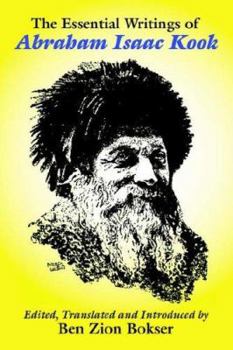The Essential Writings of Abraham Isaac Kook
Select Format
Select Condition 
Book Overview
Rabbi Abraham Isaac Hacohen Kook was the first Chief Rabbi of Palestine, and the 20th century's most important Orthodox Jewish mystic. This description may be from another edition of this product.
Format:Paperback
Language:English
ISBN:097698623X
ISBN13:9780976986232
Release Date:April 2006
Publisher:Ben Yehuda Press
Length:228 Pages
Weight:0.75 lbs.
Dimensions:0.5" x 6.0" x 9.0"
Customer Reviews
2 ratings
"Essential Writings" should be "Essential Reading!"
Published by Thriftbooks.com User , 18 years ago
For years I've been looking for a book that could give me some insight into Rav Kook the man as well as a glimpse into the movement he has created. The author does an excellent job accomplishing both. "The Essential Writings of Rav Kook" has given me a much greater understanding of this very holy man. Bokser has done a wonderful job painting the picture of this very pious, and controversial, Torah giant. I heartily recommend this book and believe that it should be required reading in all Jewish day schools/ Yeshivot.
a sometimes interesting mix
Published by Thriftbooks.com User , 19 years ago
This book includes a few writings by Rabbi Kook, the chief Orthodox rabbi of Jerusalem in the 1920s and one of the early promoters of religious Zionism. The most interesting parts of this book for me were the introduction and Rabbi Kook's personal letters. The letters tell us a lot about Rabbi Kook's character, especially: *his ability to conceal criticism beneath an avalanche of praise -for example, after an enumeration of a Jerusalem newspaper's sins, he emphasizes that "no one can deny that [it] is generally is generally an asset to the religious community in Jerusalem in its present edition." *his willingness to seek consensus where there was disagreement - for example, while rejecting a claim that ritual commandments were obsolete, he emphasized that of course they will "become obsolete in 'days to come' . . . There is a category of 'days to come' when they will not be obsolete and there is a category of 'days to come' where the commandments will be obsolete" and that the only disagreement was over which "days to come" fell into which category. The introduction was especially interesting because it gave readers a window into Rabbi Kook's world, that of pre-WW II Israel. There was as much dissension then as now, and Rabbi Kook was caught between secularists to the left and ultra-Orthodox to the right, just as modern Orthoodox and more liberal Jews in Israel are today. Wrote the son of one leading Hasidic rabbi: "Kook, may his name be blotted out, a rasha gamur [wicked man]". Rabbi Kook was criticized not just for halachic leniencies, but also for his willingness to befriend secular Zionists. Some argued that the Zionist pioneers should be shunned as godless heretics. Rabbi Kook argued, by contrast, that even secular Jews were doing good by rebuilding a Jewish presence in Israel, and that by having good relations with secular Jews he could move them to a more religious viewpoint. (Given the growth of Israel's religious Zionist movement, I would have to say that Rabbi Kook was at least partially right). His essays were less interesting to me, probably because I am not that mystically inclined. But a few points here and there grabbed me: *Rabbi Kook seemed less interested in black-and-white moral problems than in tradeoffs between good goals. For example, he points out that even the most perverted idolatrous cults arose from the noble desire "to draw close to God", and that the task of religion is to balance this desire against the necesity to "refine the desire for God" by bringing it into proper channels. If the first impluse is too strong, religion goes wild. If the latter impulse is too strong, religion becomes legalistic, stodgy and unappealing. *Rabbi Kook was not as hostile to modern science or as supportive of Biblical literalism as some of today's fundamentalists. He wrote that the Torah's purpose is not "to tell us stories about past events" but to give us "the inner meaning" of those stories. For example, it is






